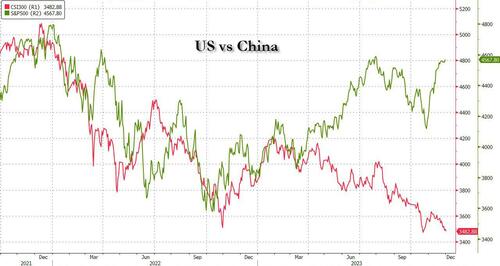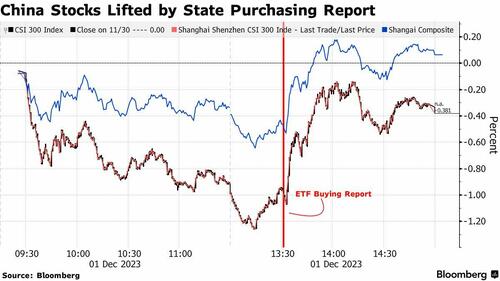While US stocks are trading just shy of 2023 highs and less than 5% from all time highs thanks to the second best November performance since 1980, China is having big problems with, well, everything... but certainly its stock market.
Overnight, Chinese shares slumped again, extending their recent underperformance versus global peers, when the CSI 300 Index was set for its lowest close since 2019 amid growing fears the relentless housing crisis will steamroll the economy, as a decline in home sales accelerated in November despite more funding support for developers.
Chinese losses were almost erased, however, and stocks rebounded in the afternoon after the China Securities Journal reported that the "National Team" was back in play, as an unidentified Chinese state institution bought exchange-traded funds whose underlying assets are A-shares issued by central state-owned enterprises in the domestic stock market Friday.
The news outlet didn’t name the institution. But after the markets closed, China Reform Holdings said in a statement that one of its units bought an unspecified amount of an ETF tracking the Guoxin Central-SOEs Technology Lead Index. According to Bloomberg, turnover for the China Southern CSI Guoxin Central-SOEs Technology Lead ETF also surged to around 10 times the daily average over the past three months on Friday, according to Bloomberg-compiled data.
As a result of Beijing's latest direct effort to prop up markets, the CSI 300 Index closed down only 0.4% after earlier falling more than 1% while the Shanghai Composite index ended in the green, bouncing back from a 0.6% slide that pushed it near the key 3,000-level that has in the past triggered intervention moves.
Stocks slumped earlier after data showed the decline in China’s home sales accelerated in November, while the latest Caixin PMI, which showed an unexpected pickup in a private gauge of China’s manufacturing activity, proved insufficient to ease fears about the economy’s recovery (and made more government stimulus unlikely).
The reported buying of ETFs “would be a policy-driven move to prop up markets as investors stand on the sidelines and are hesitant to build positions toward the end of the year,” said Shen Meng, a director with Beijing-based Chanson & Co. Lifting the market in this manner “is unlikely to bring any long-term boost apart from this knee-jerk reaction,” he said correctly. Trillions in fiscal and monetary stimulus will be needed for a sustained uplift in risk assets, something Beijing refuses to do due to China's record 300%+ debt/GDP.
Instead, authorities have taken piecemeal steps to lift confidence and put a floor under sinking markets, including purchases of ETFs and bank stocks by the sovereign wealth fund. However, rebounds have rarely lasted more than a day, speaking to profound pessimism among foreign investors in particular.
The afternoon report also drove other ETFs higher. China AMC CSI Central Enterprises Structure Adjustment ETF closed 0.5% higher, while China Universal CSI Guoxin Central-SOEs Shareholder Return ETF rose 0.8%. Bosera CSI Central-SOEs’ Innovation Driven ETF added 0.6%.
In Hong Kong, key gauges continued to slide. The Hang Seng China Enterprises Index fell 1.6%, while the Hang Seng Tech Index slumped more than 2%. The CSI 300 benchmark slid 2.1% in November, the worst performance among the world’s major equity benchmarks and missing out on a broad rally in global markets. Foreign investors sold nearly 5 billion yuan ($700 million) on a net basis Friday, following four straight months of outflows.

